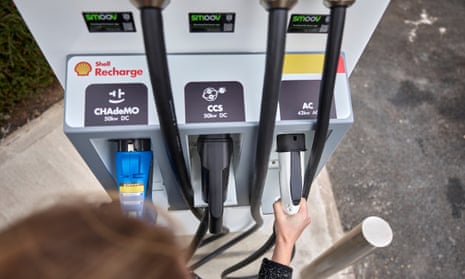Shell is opening a first wave of electric vehicle charging points at its UK petrol stations, in a sign of the far-reaching changes under way in the transport and oil sectors.
Drivers will be able to recharge 80% of their battery in half an hour at forecourts in London, Surrey and Derby from this week, with a total of 10 service stations to be equipped with rapid chargers by the end of the year.
The move marks the Shell’s first step into the UK electric car sector and comes days after the Anglo-Dutch oil company bought NewMotion, a Dutch firm with 30,000 private charging points at homes and offices in Europe.
Shell said the forays into charging were spurred by the swift growth in battery-powered cars, which now number more than 115,000 in the UK, up from almost zero a decade ago.
“There’s no doubt the electric vehicle market is developing fast. And we want to offer customers choice: it doesn’t really matter what kind of vehicle they’re driving, we want them to drive into a Shell station, refuel in whatever capacity the fuel is,” said Jane Lindsay-Green, UK future fuels manager at Shell.
The NewMotion acquisition and service station charging points could prove an important hedge by big oil against the impact of electric cars, which experts said this week would cause petrol demand to peak by 2030.
“We want to make sure we are positioning ourselves for the future,” said Lindsay-Green, who described the two schemes as complementary.
Shell acknowledged it was taking baby steps into the market, with just 10 out of its 1,000 fuelling stations in the UK adding charging points to begin with.
“The market is very young. We are learning here. We’ve started very small. It’s 10 sites, it’s certainly not a mass market yet for us,” said Lindsay-Green.
The company is also catering for the tiny number of hydrogen cars on UK roads – believed to number as few as 50 – and this year installed a hydrogen pump at its Cobham services on the M25. Shell will have three stations with hydrogen refuelling by the end of the year.
With rapid electric charging points typically costing $30,000-$50,000 (£22,700-£38,000) each, the 10 electric charging stations mark a minuscule fraction of the $25bn Shell spends on oil each year.
But industry watchers said the infrastructure and recent acquisition were noteworthy.
Colin McKerracher, an analyst at Bloomberg New Energy Finance, said: “I think it is significant that a major oil company is investing in charging infrastructure and that they bought NewMotion.
“I wouldn’t say it spells the end of the pump as we know it, but we are on the way to a world with a broader mix of vehicles on the road, and Shell are making a play to keep their stations relevant.”
Greenpeace, which has previously protested at Shell’s UK service stations over its oil drilling plans, said the country needed more charging points.
Rosie Rogers, clean air campaigner at Greenpeace, said: “In order to really kick start the electrification of our road network, we need to see a lot more rapid charge points in petrol station all over the country, as well as in supermarkets, car parks and motorway services.”
Branded Shell Recharge, the charging points will cost a discounted 25p per kilowatt hour of power until next June, when the price will revert to its normal level of 49p per kWh.
At the normal price, that means recharging a Nissan Leaf from virtually flat to a full charge would cost nearly £20, while a top-end Tesla Model S would cost almost £50. Customers pay via a credit card registered to an app on a pay-as-you-go basis rather than the subscription basis that some electric car charging schemes operate on.
The initial locations, all but one of which is in or around London, were chosen based on how busy they are. “Locations that have a lot of through-traffic, and also locations where perhaps the existing electric vehicle infrastructure needs boosting,” said Lindsay-Green.
Shell said that in a handful of cases it paid for upgrades to the local energy grid, to make it capable of handling the rapid charging points. The UK is the first market where Shell is piloting the Recharge offering, which is to expand next to the Netherlands.

Comments (…)
Sign in or create your Guardian account to join the discussion